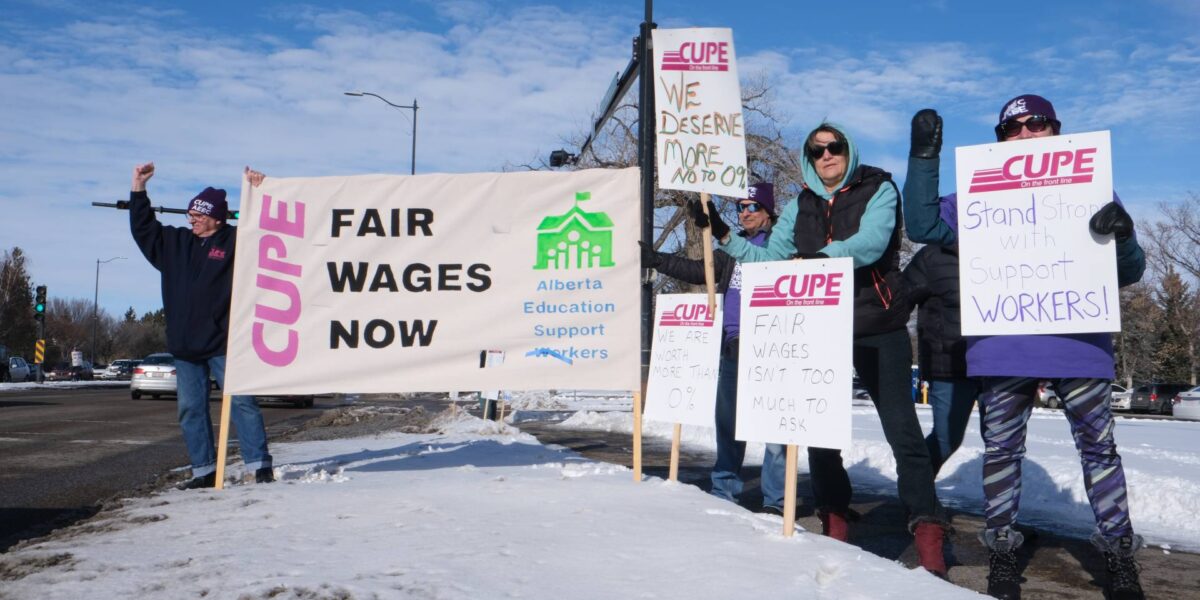Alongside Mayor Magrath Dr., one of the busiest roads in Lethbridge, cars honked on their horns to demonstrate their solidarity with educational support workers. About 350 Canadian Union of Provincial Employees (CUPE) members gathered in Lethbridge, AB, demanding a long overdue wage increase from the Alberta government.
Educational support workers have gone eight years without a wage increase despite the rising cost of living and inflation. The average annual salary for education support workers, such as custodians and administration staff, is about $34,300 and for educational assistants, their average annual salary is $26,388.
Some educational support workers are treading the poverty line, having to rely on food banks or even taking a second or third job.
“According to the standard cost of living, I am living way below the poverty line. And that’s not easy,” said Katey Schmidt, educational assistant with the Holy Spirit School Division and CUPE local 1825 member, to rabble.ca.
“Especially in today’s society, when prices just keep going up and up and up and up and I’ve stayed the same for almost 10 years now. It’s not enough and there’s definitely going to be some backlash if things don’t change,” she added.
Low wages hurting education support staff across the board
Although educational assistants are funded to support students one-on-one, Schmidt said that at her school she is just one educational assistant to three classrooms with about 25 students in each class—that’s about 75 students in total.
“Even though I am assigned one-on-one with a child, I’m working with every student in that school—helping them learn and support them with whatever they need, whether it be academic support or even if they just need a band aid or a shoulder to cry on because something went wrong,” said Schmidt. “That’s what we’re there for and that’s what we do every day.”
Schmidt loves her job, however, there have been many times where she has felt unsafe. Working as an educational assistant, she has students with high and complex needs and has experienced situations that have escalated.
“I’ve been hit, spit on, kicked, screamed at, berated, pinched, have had things thrown at me and have been called every name in the book. I try my best to give my heart and soul to what I do, only to be told I’m trash and be abused,” said Schmidt during her speech at the rally.
Joanne Lavkulich, president of CUPE Local 1825 and chairperson of the Alberta Education Employees Committee has seen educational staff become burnt out.
“Mental health is a very serious issue and we have more and more staff who are suffering. They handle the job. We do it because we love the kids, but we don’t have the supports,” said Lavkulich.
“And when you work more than one job, you’re not at home with your kids. So we’re taking care of everyone else’s kids and we don’t have time to spend with our own. So it is becoming a greater mental health issue,” she added.
Then, there’s also the issue of the growing class sizes—teachers, educational assistants and support staff who are already spread thin are faced with handling more and more students. This continues to add the pressure of trying to support each student.
“Adding more kids, it just exasperates the system—it’s hard and it’s impossible,” said Schmidt. “I can try my best to give everything to the kids, but you can’t bleed water from a stone.”
Fixing wages is the first step to repairing Alberta education
In November 2023, Alberta Minister of Education Demetrios Nicolaides announced adding an additional $30 million in funding for the 2023-24 school year after student enrollment increased. According to the Alberta government, school authorities would receive $1,500 per student for growth enrollment under 100 and $2,000 per student for growth enrollment that exceeds $2,000.
Although the funding is welcome, it’s not enough to keep up with growing student enrollment which Alberta school boards estimated to reach 20,000 students throughout the year. The Alberta Teachers’ Association (ATA) criticized this last year when the funding was announced.
Lavkulich added that hiring new staff isn’t enough—educational support workers need a fair wage.
“Education support workers are forgotten. We live below the poverty line and in a province as rich as Alberta with an $11.6 billion surplus last year, something could have been given to the education support workers,” said Lavkulich.
Rory Gills, president of CUPE Alberta, added that worker retention in education is low with people leaving education support roles.
“If you might remember, during the election, both parties talked about hiring 3,000 more people. And we said to both parties, ‘that’s great, but you have to pay them properly.’ When the UCP got elected, they walked away from that promise—and I’ll tell you why. There isn’t anybody to fill those jobs. That’s the biggest thing we’re seeing now,” said Gills.
“And there’s a simple reason why—they don’t pay enough.”
Wage increases have been long overdue, but there has been progress. On February 6, CUPE Local 40, representing custodial and other support workers in Calgary, AB, ratified a 7.75 per cent wage increase deal and other locals are hoping for the same.
Gills also added that there is much more work to be done for the province’s public education, but just like Lavkulich has said fixing wages is the first step.
“We know that it’s not just wages. We know that there’s more people in the system. We know we need to build more schools. We need to look at the curriculum in Alberta. There’s so many things we need to do, but the first thing we need to do is make sure the people in the system now can support themselves—and that’s why we’re here,” said Gills.



